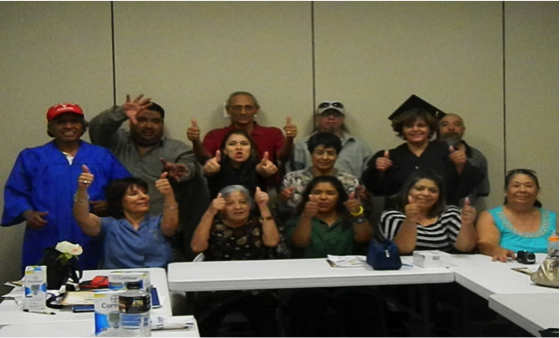Health Care for the Homeless Program: Project Vida Health Center | El Paso, Texas
Contact: Aida Ponce, Health Education Supervisor | http://www.projectvidaelpaso.org
Project Vida is located in El Paso, Texas, which borders the city of Juarez, Mexico. The majority of patients at Project Vida Health Center (PVHC) are of Mexican-origin. Adequate housing and access to health care services are top concerns facing this population. Project Vida is a multi-faceted organization with departments addressing economic development, education, homeless prevention, and affordable housing, in addition to Project Vida Health Center. The health center offers primary care services through seven El Paso clinics. PVHC uses community health workers (CHWs) to address the social, economic, and physical conditions that underlie their patients’ health (or the social determinants of health) by providing health and social service outreach.
As part of their outreach activities, CHWs teach health education courses, attend health fairs, and work in the organization’s multiple mobile units. They are also trained to screen for housing issues during these events. Project Vida has multiple housing sites of its own, and also provides renter’s assistance and transitional living. Thus, the CHWs are able to refer community members and patients directly to Project Vida’s Affordable Housing department. At times, the CHW will go to the housing department with the patient, increasing the trust and bond with the patient through personal connection. Medical providers at PVHC also will put patients in contact with a CHW if they discover housing as an issue negatively affecting their well-being.
Diabetes is the predominant health issue that affects PVHC’s priority population. The CHW program also uses strategies to address the social determinants of health that may cause or worsen this chronic disease. Some of these strategies include:
- Physical Activity: During some outreach events, CHWs will lead exercise classes at schools or at churches. These get the community moving and promote the organization’s on-going Zumba, yoga, and kickboxing classes.
- Education and Lifestyle Change: PVHC offers the nationally accredited Diabetes Education Empowerment Program (DEEP). First, CHWs attend a training-of-trainers workshop on providing diabetes education during outreach events, including identifying behavioral risk factors and promoting physical activity and proper nutrition. Next, they lead the second phase of DEEP, which includes eight classes on preventing and maintaining diabetes for diagnosed or high-risk patients. Once the course is finished, PVHC offers an ongoing support group for patients to share experiences and continue their education regarding the disease.

Graduates from one of PVHC’s DEEP courses
Project Vida’s priority population experiences complicated legal issues and language barriers, and having CHWs that are members of the community they serve helps build trust and better understand the barriers patients face. For example, some of the diabetes educators are diabetes patients themselves. This shared experience helps foster a bond with the rest of those participating in the DEEP classes. To become a CHW at PVHC, an individual must be fluent in English and become a state-certified community health worker. They also must participate in further training at Project Vida, including understanding HIPAA guidelines and using electronic health records.
Through outreach and education, CHWs connect community members and patients to services that improve their overall well-being. They bridge the gap between one’s personal health and their social context, thereby addressing the community’s social determinants of health and allowing Project Vida’s wide-range of services to thrive.
HOP tip: As technology, health trends, and political climates change, PVHC recommends constant training on emerging topics (such as the Affordable Care Act) to keep their staff up to speed. This can best be accomplished by having organizational leadership support. As Aida Ponce, Health Education Supervisor at Project Vida says, “without buy-in from the top, you can’t do anything!”
This publication was made possible by grant number U30CS09743 from the Health Resources and Services Administration, Bureau of Primary Health Care. Its contents are solely the responsibility of the authors and do not necessarily represent the official views of HRSA.
